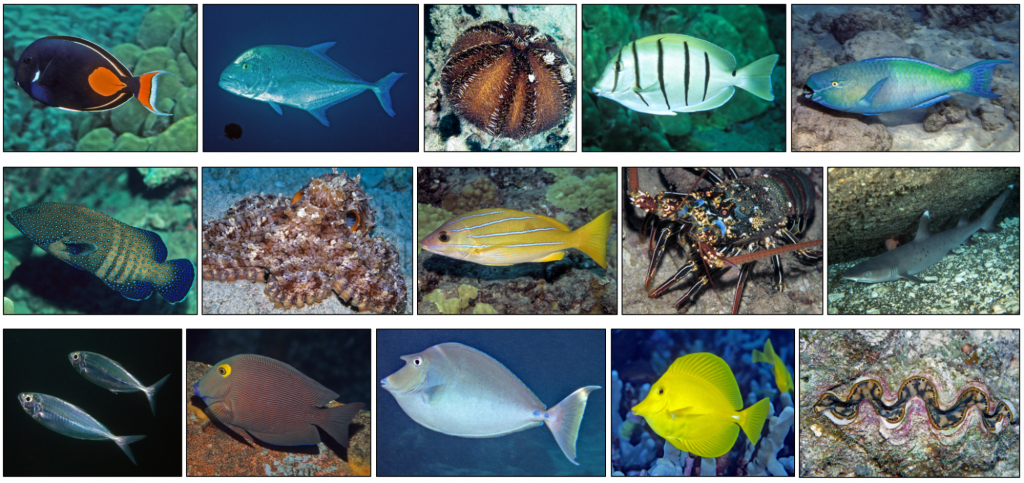The Pacific Islands Vulnerability Assessment project evaluated the susceptibility of 83 marine species in the Pacific Islands region to the impacts of climate change. We identified key attributes and factors that drive this vulnerability, as well as critical data gaps in understanding climate change impacts on marine life.
The most vulnerable to climate change were the invertebrate group; the least vulnerable were pelagic and coastal groups not associated with coral reefs. Sea surface temperature, ocean acidification, and oxygen concentration are the main drivers of vulnerability among all of the environmental stressors we examined.
The goal of the assessment was to answer key questions:
- Which species are most vulnerable to climate change?
- Are there aspects of their life cycle that should be of concern?
- What are the critical stressors involved?
- Where should science and management focus efforts to reduce these risks?
Dr. Don Kobayashi, assessment lead, shares, “The project is critically important to the NOAA mission because there are still too many unknowns about the impacts of climate change to our marine fisheries and ecosystems. This work gives us broad insights across many species and across many ecosystems spanning the entire Pacific Islands region. We simply do not have the time to answer pressing questions about climate change by the usual approach of exhaustively studying one or a few species in a single location at a single point in time and moving on. We need more work like this that provides a synoptic bigger picture view of climate change impacts across the board.”
Assessment Methodology
The assessment applied workshop discussions, literature review, expert knowledge, and climate projection models coupled with existing biological knowledge to consolidate the best available science.
We began the project by scouring the scientific literature for any climate-relevant information available for the species of interest and compiled 83 profiles. In each one, we summarized all published information pertaining to the species’ sensitivity to environmental stressors.
We focused on 83 species representing a variety of marine ecosystems including:
- Hawaiian Archipelago
- Mariana Archipelago (Guam and Saipan)
- American Samoa
- Pacific Remote Island Areas (Baker Island, Howland Island, Jarvis Island, Johnston Atoll, Kingman Reef, Palmyra Atoll, and Wake Island)
These species included some that are important for commercial and non-commercial harvest. They are also important for the ecosystem and local culture.
Identifying Data Deficiencies and Research Needs
Early life history survival and settlement requirements were the most data deficient of the sensitivity attributes we considered. The sensitivity of many coral reef fish ranged between low and moderate, which we likely underestimated because reef species’ habitat is extremely threatened by climate change. We identified research needs to sustain marine life in a changing climate across the Pacific Islands region.
Expert Panel Review
Once we completed the species profiles, a panel of experts evaluated the information with respect to climate change. The panel consisted of scientists from NOAA, the University of Hawaiʻi at Mānoa, the Hawaiʻi Institute of Marine Biology, the Western Pacific Regional Fishery Management Council, and James Cook University in Australia. The panel scored the sensitivities of each species with respect to individual environmental stressors.
Participants held a 3-day workshop to discuss scoring and summarize the overall vulnerability rankings. They combined all of the scoring information into a final estimate of each species’ sensitivity to individual stressors. The species narratives, final results of the assessment, consolidate sensitivity and exposure information into overall climate vulnerability results for each species. Many authors collaborated on the species narratives which are a critical, foundational part of the Pacific Islands vulnerability assessment project. They created data reports for shark, coastal fish, coral reef fish, invertebrate, pelagic fish, and deep slope fish species.
The culmination of all of the work is the publication, “Assessing the vulnerability of marine life to climate change in the Pacific Islands region.”
NOAA Fisheries scientists and researchers continue to study and strengthen our understanding of changing ocean conditions and the effects on our ocean resources. With these findings, we are continuing to provide resource managers and stakeholders the best-in-class climate, ocean, and ecosystem information, which they can use to assess risks, identify adaptation strategies, and safeguard the nation’s marine resources and the communities that depend on them.

